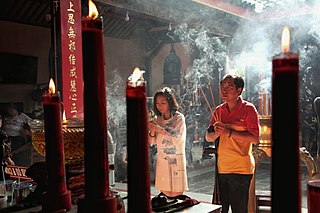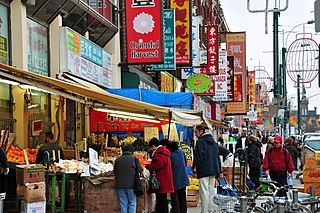External links
| Canada | |||||||||||||
|---|---|---|---|---|---|---|---|---|---|---|---|---|---|
| Africa |
| ||||||||||||
| Americas |
| ||||||||||||
| Asia |
| ||||||||||||
| Europe |
| ||||||||||||
| Oceania | |||||||||||||
| Africa | ||
|---|---|---|
| Americas | ||
| Asia | ||
| Europe | ||
| Oceania | ||
| Others | ||
Canadians of Asian descent by area of origin | ||
|---|---|---|
| Central Asia | ||
| East Asia | ||
| Southeast Asia | ||
| South Asia | ||
| West Asia | ||
| Total population | |
|---|---|
| 28,290 (2021) [1] | |
| Regions with significant populations | |
| Toronto, [2] Vancouver, Victoria | |
| Languages | |
| Indonesian, English, French, Dutch [3] | |
| Religion | |
| Christianity · Sunni Islam [4] |
Indonesian Canadians are Canadian citizens of Indonesian descent or Indonesia-born people who reside in Canada. They are one of the smaller Asian minorities in Canada.
In the early post-World War II period, most migrants from Indonesia to Canada were Indo people of mixed Dutch and pribumi ancestry. Many did not come directly from Indonesia, but rather went to the Netherlands and then re-migrated due to racial prejudice they faced there. Community members believe that perhaps 3,000 live in the Ontario area. [5] These migrants tend to be fluent in Dutch, and may also speak Indonesian, or more commonly Indonesian-based trade languages. However, Indonesians of Chinese descent formed the main group in the stream of migration which began in the late 1960s and early 1970s. [3] They have come to comprise an estimated 80% of Canada's population of Indonesian background. Most do not speak any variety of Chinese. [6]
7,610 respondents to the 1991 census stated their place of birth as "Indonesia". [7] Around half of those were settled in the Greater Toronto Area. [2] May 1998 riots in Indonesia also led to several Chinese Indonesians moving to Canada. Data from the 2006 Census suggested that 14,320 people of Indonesian ethnic origin reside in Canada (3,225 single responses, 11,095 in combination with other responses), primarily in Ontario (6,325, or 44%), British Columbia (4,640, or 32%), and Alberta (1,920, or 13%).
More than half of Indonesian Canadians are believed to be Christians, with roughly equal numbers of Catholics and Protestants. In contrast, although Islam is Indonesia's majority religion, Muslims are estimated to make up only about 10% of Indonesian Canadians. An Indonesian Catholic congregation, the Ummat Katholik Indonesia, has been meeting in the Toronto area since 1979; it was first headed by a Dutch priest who had previously lived in Indonesia, and later by a Javanese theology student from the University of Toronto. An inter-denominational Protestant fellowship, the Indonesian Christian Fellowship, also emerged in Toronto in the 1980s. [6]
The first Indonesian community organisations in Canada, the Indonesian-Canadian Association and the Canadian-Indonesian Society, were founded in 1969 in Toronto and Vancouver, respectively. Indonesian consuls' wives also set up branches of Dharma Wanita, a women's group, in various cities. A credit union, Indoka (Indonesian Credit Union) was established in the early 1970s. A group of Muslim and Christian women formed Sanggar Budaya (Culture Workshop), a dance and music group, a few years later. [8] There is also an Indonesian Catholic Organisation comprising mainly ethnic Chinese, as well as INCASEC (Indonesian Canadian Senior Citizens). [9]

Chinese Indonesians, colloquially Cindo, Chindo or simply Orang Tionghoa or Tionghoa are Indonesians whose ancestors arrived from China at some stage in the last eight centuries. Chinese Indonesians are the fourth largest community of Overseas Chinese in the world after Thailand, Malaysia, and the United States.
Religion in Canada encompasses a wide range of beliefs and customs that historically has been dominated by Christianity. The constitution of Canada refers to God and the monarch carries the title of Defender of the Faith, however Canada has no official church and the government is officially committed to religious pluralism. Freedom of religion in Canada is a constitutionally protected right, allowing individuals to assemble and worship without limitation or interference.

Irish Canadians are Canadian citizens who have full or partial Irish heritage including descendants who trace their ancestry to immigrants who originated in Ireland. 1.2 million Irish immigrants arrived from 1825 to 1970, and at least half of those in the period from 1831 to 1850. By 1867, they were the second largest ethnic group, and comprised 24% of Canada's population. The 1931 national census counted 1,230,000 Canadians of Irish descent, half of whom lived in Ontario. About one-third were Catholic in 1931 and two-thirds Protestant.

German Canadians are Canadian citizens of German ancestry or Germans who emigrated to and reside in Canada. According to the 2016 census, there are 3,322,405 Canadians with full or partial German ancestry. Some immigrants came from what is today Germany, while larger numbers came from German settlements in Eastern Europe and Imperial Russia; others came from parts of the German Confederation, Austria-Hungary and Switzerland.
The Demographics of Montreal concern population growth and structure for Montreal, Quebec, Canada. The information is analyzed by Statistics Canada and compiled every five years, with the most recent census having taken place in 2021.
Hungarian Canadians are persons in Canada of Hungarian ancestry. According to the 2016 Census, there are 348,085 Canadians of Hungarian ancestry. The Hungarian minority is the 24th largest ethnic group of Canada. The bulk of Hungarian immigration occurred after World War II, with the wave peaking after the 1956 Hungarian revolution against communist rule, when over 100,000 Hungarian refugees went to Canada. The Hungarian Canadian community is among the country's multiple ethnicities; Canada is one of the top five countries of the Hungarian diaspora.
The demographics of Toronto, Ontario, Canada make Toronto one of the most multicultural and multiracial cities in the world. In 2021, 57.0 percent of the residents of the metropolitan area belonged to a visible minority group, compared with 51.4 percent in 2016, and 13.6 percent in 1981. Toronto also has established ethnic neighbourhoods such as the multiple Chinatowns, Corso Italia, Little Italy, Little India, Greektown, Koreatown, Little Tokyo, Little Jamaica, Little Portugal, Little Malta, Roncesvalles (Polish), and Bloor West Village (Ukrainian), which celebrate the city's multiculturalism. Data from the suburban municipalities are also included for some metrics as most of these municipalities are part of the Toronto CMA.
Laotian Canadians, are Canadian citizens of Laotian origin or descent. In the 2016 Census, 24,580 people indicated Laotian ancestry. Bilateral relations between Canada and Laos were established in 1954 with the formalization of the independence of the Kingdom of Laos from France. In August 2015, Canada's first resident diplomat opened the Office of the Embassy of Canada in Vientiane, Laos.

Indonesian Americans are migrants from the multiethnic country of Indonesia to the United States, and their U.S.-born descendants. In both the 2000 and 2010 United States census, they were the 15th largest group of Asian Americans recorded in the United States as well as one of the fastest growing.

Christianity is Indonesia's second-largest religion, after Islam. Indonesia also has the second-largest Christian population in Southeast Asia after the Philippines, the largest Protestant population in Southeast Asia, and the third-largest Christian population in Asia after the Philippines and China, followed by India. Indonesia also has the second-largest Christian population in the Muslim world, after Nigeria, followed by Egypt. Indonesia's 29,1 million Christians constituted 10,49% of the country's population in 2022, with 7,43% Protestant (20.6 million) and 3,06% Catholic (8.5 million). Some provinces in Indonesia are majority Christian. In Indonesia, the word Kristen refers to Protestantism, while Catholicism is referred to as Katolik. In recent times, the rate of growth and spread of Christianity has increased, especially among the Chinese minority.
Korean Canadians are Canadian citizens of full or partial Korean ancestry, as well with immigrants from North and South Korea. As of 2016, Korean Canadians are the 8th largest group of Asian Canadians.
Egyptian Canadians are Canadian citizens of Egyptian descent, first-generation Egyptian immigrants, or descendants of Egyptians who emigrated to Canada. According to the 2011 Census there were 73,250 Canadian citizens who are from Egypt, having an increase compared to those in the 2006 Census.

Indo-Canadians or Indian Canadians are Canadians who have ancestry from India. The term East Indian is sometimes used to avoid confusion with the Indigenous peoples of Canada. Categorically, Indo-Canadians comprise a subgroup of South Asian Canadians which is a further subgroup of Asian Canadians. According to Statistics Canada, Indians are one of the fastest growing communities in Canada, and one of the largest non-European ethnic groups.

Canadians are people identified with the country of Canada. This connection may be residential, legal, historical or cultural. For most Canadians, many of these connections exist and are collectively the source of their being Canadian.
European Canadians, or Euro-Canadians, are Canadians who were either born in or can trace their ancestry to the continent of Europe. They form the largest panethnic group within Canada.

Christianity is the most adhered-to religion in Canada, with 19,373,330 Canadians, or 53.3%, identifying themselves as of the 2021 census. The preamble to the Canadian Charter of Rights and Freedoms refers to God. The French colonization beginning in the 17th century established a Roman Catholic francophone population in New France, especially Acadia and Lower Canada. British colonization brought waves of Anglicans and other Protestants to Upper Canada, now Ontario. The Russian Empire spread Orthodox Christianity in a small extent to the tribes in the far north and western coasts, particularly hyperborean nomads like the Inuit. Orthodoxy would arrive in mainland Canada with immigrants from the eastern and southern Austro-Hungarian Empire and western Russian Empire starting in the 1890s; then refugees from the Soviet Union, Eastern Bloc, Greece and elsewhere during the last half of the 20th century.
Lithuanian Canadians are Canadians who are of full or partial Lithuanian descent. Over two-thirds of Lithuanian Canadians reside in Toronto, with other much smaller populations scattered around most of the Canadian provinces and territories.

The Chinese Canadian community in the Greater Toronto Area was first established around 1877, with an initial population of two laundry owners. While the Chinese Canadian population was initially small in size, it dramatically grew beginning in the late 1960s due to changes in immigration law and political issues in Hong Kong. Additional immigration from Southeast Asia in the aftermath of the Vietnam War and related conflicts and a late 20th century wave of Hong Kong immigration led to the further development of Chinese ethnic enclaves in the Greater Toronto Area. The Chinese established many large shopping centres in suburban areas catering to their ethnic group. There are 679,725 Chinese in the Greater Toronto Area as of the 2021 census, second only to New York City for largest Chinese community in North America.

Protestantism in Canada has existed as a major faith in Canada ever since parts of northern Canada were colonized by the English. As of 2001, 29.2% of Canadians identified as Protestant. According to a study by Pew Researchers published in 2013, 27% of Canadians are Protestant. Based on 2011 estimates, Protestant faiths collectively form the third largest religious group in Canada after the largest, Roman Catholicism, and the second largest group, those with no religious affiliation.

Yugoslav Canadians are Canadians of full or partial Yugoslav ancestry. At the 2016 Census, the total number of Canadians whose origins lie in former Yugoslavia, majority of whom indicated specific ethnic origin, was 386,340 or 1.12% of the total population.